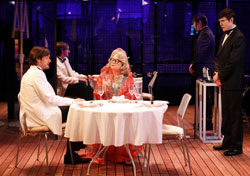Review: In Masks Outrageous and Austere

Tennessee Williams certainly doesn’t make it easy to be generous.
The common perception about the legendary playwright’s later works is that they were sad reflections of his former glory, but they have also been unfairly maligned by unfeeling critics expecting another Streetcar or Cat on a Hot Tin Roof. But however generous one wants to be in assessing In Masks Outrageous and Austere, the playwright’s purportedly final work—he’s had more posthumous releases than Tupac Shakur—it’s impossible to ignore the fact that it’s an unholy mess.
It’s a beautifully staged unholy mess, though, as seen in this world premiere production directed by David Schweizer and starring Shirley Knight, whose half-century affiliation with the playwright goes back to the 1962 film Sweet Bird of Youth.
Unfinished at Williams’ death in 1983, the play is set on a sundeck facing the ocean that is being guarded by three mysterious sunglass-wearing, sharp-suited operatives code-named “Gideon.” They are either protecting or holding captive “Babe” (Knight), an elderly heiress of a chemical company, as well as her much younger lover Billy (Robert Beitzel, looking and acting like Ashton Kutcher) and Billy’s “secretary”/lover Jerry (Sam Underwood).
Among the other bizarre characters wandering throughout the proceedings are Mrs. Gorse-Bracken, a middle-aged matron (Alison Fraser) who sings opera when she’s not meddling in Babe’s affairs; her mute, growling African-American husband (Jermaine Miles) and his dwarf interpreter (Jonathan Kim); and a chambermaid (Pamela Shaw) and her macho, garage-mechanic boyfriend (Christopher Halladay).
The desperate Babe periodically checks in by phone with her support system, played on video by Buck Henry and Austin Pendleton. Otherwise the surreal action is nearly incomprehensible, with such plot elements as the matron’s unseemly obsession with her young, mute son (Connor Buckley), who she calls “Playboy.”
“Latent incest on top of everything else?” rightly complains the aggrieved Babe. “My God, if this were theater, I’d think it a metaphor for the idiocy of existence.”
It is theater, and it probably is a metaphor, one of many awkward ones cluttering up this work that is sorely lacking the poetic language for which the playwright was renowned. Fans, however, will enjoy spotting the similarities and references, both overt and oblique, to such earlier works as The Milk Train Doesn’t Stop Here Anymore.
Director Schweizer has delivered an elaborately glossy production, with the theater outfitted with wraparound video screens and transparent side booths in which the peripheral action takes place. But for all the care lavished on the staging, not to mention the fine performances by Knight and Fraser as the dueling grande dames, there’s no disguising the fact that this final work from one of our greatest playwrights is little more than an unfortunate, if at times admittedly fascinating, curiosity.
Culture Project, 45 Bleecker St. 866-811-4111. www.cultureproject.org. Through May 26.
| Print article | This entry was posted by Frank on 04/17/12 at 06:37:03 am . Follow any responses to this post through RSS 2.0. |